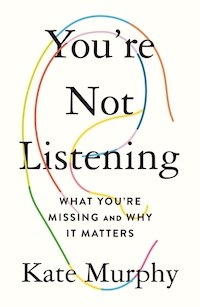 The latest two books from the Next Big Idea Club – curated by Daniel Pink, Malcolm Gladwell, Adam Grant, and Susan Cain – arrived just a few weeks before we all found ourselves at a “social distance.”
The latest two books from the Next Big Idea Club – curated by Daniel Pink, Malcolm Gladwell, Adam Grant, and Susan Cain – arrived just a few weeks before we all found ourselves at a “social distance.”
As I filled my red bucket full of books and other materials that I would need to work from home, I grabbed one of the Next Big Idea books, You’re Not Listening: What You’re Missing and Why by Kate Murphy.
 Those who know me well are aware that I am still working on my listening habits. I’m easily distracted, prone to wondering “what if”, and I often find myself with a long list of “to-do” items which can make active listening difficult.
Those who know me well are aware that I am still working on my listening habits. I’m easily distracted, prone to wondering “what if”, and I often find myself with a long list of “to-do” items which can make active listening difficult.
Yet, I know the critical importance of listening to others. For many of our colleagues, listening is one of the best gifts you can give. That’s why I made reading this book a top priority.
Advice from a professional listener
The author, Kate Murphy, is a journalist who writes for the New York Times, Texas Monthly, and other publications. To succeed in her professional work, she must have well-honed listening skills.
In the book she shares both personal tips and many techniques used by others (including a CIA agent, focus group moderator, bartender, radio producer, and top furniture salesman). One of her key findings is that when we actively listen to what people say, we learn more, give more, and thrive more.
Bad Listening Behaviors (p. 22)
How many of these are you “guilty” of from time to time?
✻ Interrupting
✻ Responding vaguely or illogically to what was just said
✻ Looking at a phone, watch, around the room, or otherwise away from the speaker
✻ Fidgeting (tapping on the table, frequently shifting position, clicking a pen, etc.)
Throughout the book, Murphy quotes people from all walks of life who worry that listening is becoming a lost art. For example, near the end of the book, she calls upon Father Jorge Gomez, the rector of the Basilica of Our Lady of San Juan del Valle in San Juan, Texas.
More than 20,000 people visit the church weekly, many searching for someone to listen to them. “I’ve begun to think there is a crisis of listening in our world,” says Father Gomez, adding “There are a lot of people who want to talk but very few who want to listen, and we are seeing people suffer from it” (pp. 219-220).
We all remember times when someone was talking to us and we failed to give them our complete attention; or worse…we tuned them out completely. I still recall a time when my oldest son, then about 16, was talking to me. It had been a long day, I was cooking supper, and my attention was not on him. “You’re NOT listening to me!” he said angrily as he stomped out of the room. How I wish I could turn back time, just for a few minutes, to change that moment!
Kate Murphy’s big ideas
In the book, Murphy identified eight big ideas, as seen in the Reader’s Guide developed by the Big Idea Club:
- We don’t need telepathy to share brain waves with others. Neurologists have found that when we’re truly in sync with others, our brain waves are almost identical. Why is this important? Frequently listening to friends helps ensure that you will move closer to a shared understanding of things.
- It’s not just what you say—it’s how you say it. Murphy points to research that shows at least 55 percent of communication is nonverbal. Active listening requires paying attention to how things are said – facial expressions and gestures oftentimes communicate more than our words.
- Create an environment for active listening. Move away from electronic devices and find a place that is conducive to listening.
- We’re especially bad at listening to loved ones, as my story about my son attests. Murphy suggests that we often “overestimate our ability to read those closest to us.”
- Engage your curiosity about others. Think of someone you consider a good listener. Chances are they demonstrate real curiosity when talking with you through asking questions and tending to that all-important nonverbal part of communication.
- Support, rather than shift away from, what someone is saying. This shifting often involves “autobiographical listening,” where we hijack a conversation telling the conversant how what they said relates to something we did, experienced, or thought. Murphy calls it “conversational narcissism.” Instead, we should encourage the speaker to continue talking by asking questions or using think time.
- Gossip is good for you. This highlight was surprising. Researchers found that less than five percent of gossip is malicious. Rather, according to Murphy, gossip accounts for more than 50 percent of conversations and helps us “judge who is trustworthy, who we want to emulate, how much we can get away with, and who are likely allies or adversaries.”
- To better listen to others, you have to slow down and listen to yourself. Our brains process information more rapidly than someone speaks, so we need to be vigilant in listening to the other person and silencing our inner voice.
How Does This Apply to Social Distancing?
As I read, I became hopeful that some of Murphy’s admonitions about the consequences of poor listening might be addressed during or after our time of social distancing.
She provides countless examples of how technology interferes with active listening. For example, just the mere presence of a cell phone on a table is distracting to people. Our limited attention span, and our ability to filter the views of people with whom we disagree, limits our understanding and openness.
In our current circumstances, the same technological tools that can distract are being used to reconnect people through Facetime with family, virtual meals and cocktail parties, and calls to to old friends. In my own experience, I notice that I am paying more attention as I listen to people who I am isolated from. Perhaps we can understand and continue to embrace the value of these deep connections even after we’re able to be together again.
My hope is that after the end of this pandemic, we’ll all emerge as better listeners, committed to not only understanding, but appreciating the person with whom we’re conversing.
BONUS: Insights about Listening Worth Considering
✻ Listening is more of a mindset than a checklist of dos and don’ts.
✻ Hearing is not the same as listening.
✻ To listen well is to figure out what’s on someone’s mind and demonstrate that you care enough to want to know.
✻ Good listeners are good questioners. Everyone is interesting if you ask the right questions.
✻ When someone says something to you, it’s as if they are tossing you a ball.
✻ Talking about yourself doesn’t add anything to your knowledge base.
✻ Listening is a matter of you deciding you don’t need to worry about what to say next.
✻ We only become secure in our convictions by allowing them to be challenged.
✻ When people feel known and appreciated, they are more willing to share.


0 Comments on "What You’re Missing: How Can We Become “Active Listeners”?"